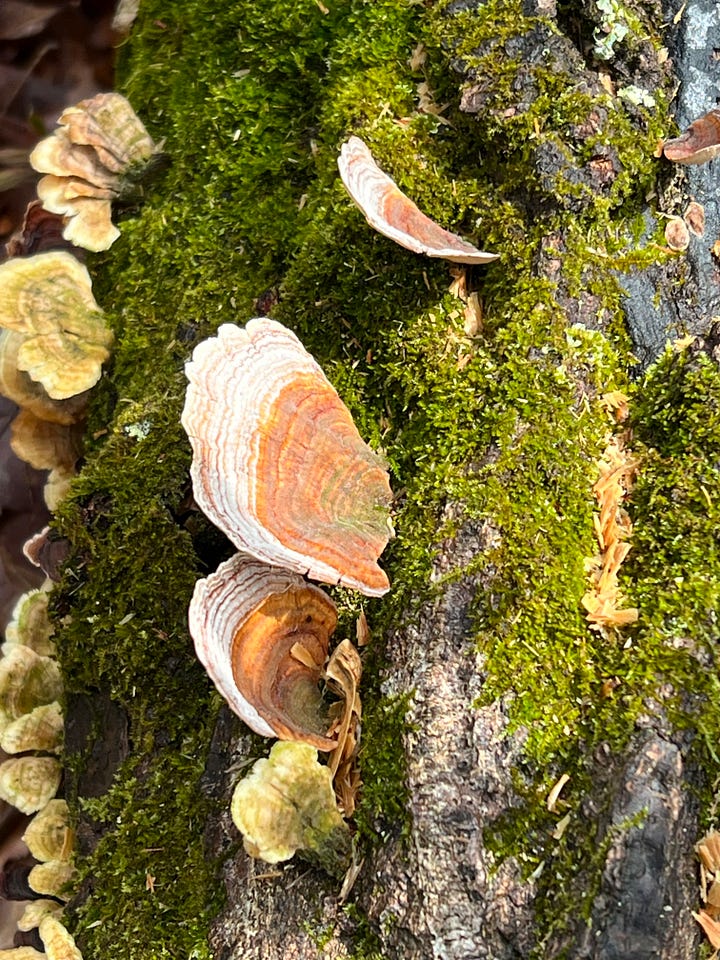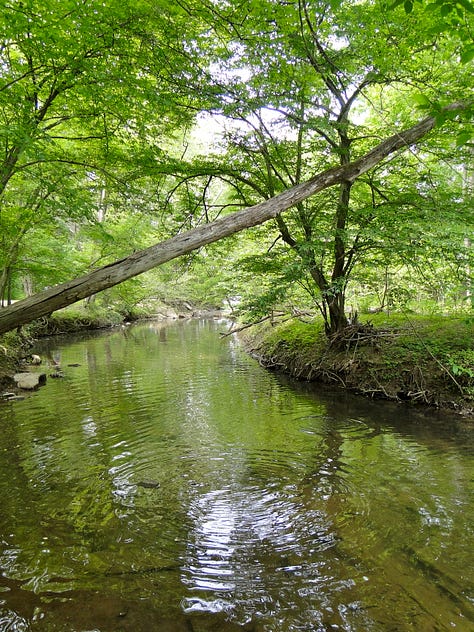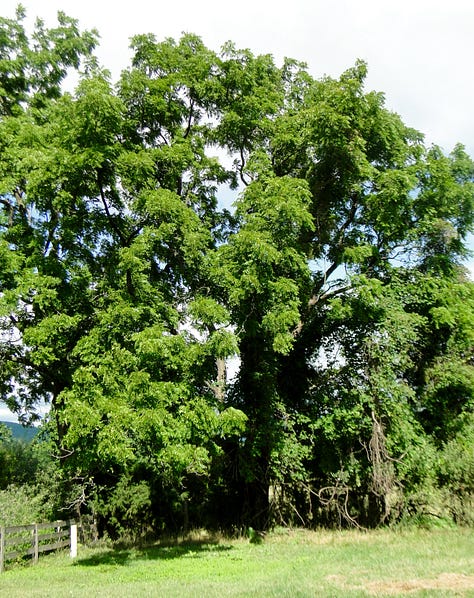Welcome to new subscribers! Thanks for joining us on this journey. Be sure to scroll to the bottom of the feed to see a list of upcoming events.
When I am among the trees,/ … they give off such hints of gladness,/ I would almost say that they save me, and daily. ~ Mary Oliver
The woods around us are filled with invitations. Are we listening? Perhaps we wander through on our way to elsewhere, giving little attention to the lives that make ours possible. Maybe we walk a trail as part of a plan to increase our fitness so keeping a pace feels more important than taking in the beauty. Sometimes we might hope to experience the creatures who live there; birding comes to mind. Or perhaps we seek solace, support, or connection. We may enter the woods longing for a deeper relationship, one we might have known as a child or in special moments, but that now seems distant.
This reflection began after reading a recent article on forest bathing. Shinrin-yoku, this Japanese practice of mindfulness and self-care, has spread far and wide so you have no doubt heard of, if not experienced it, for yourself. (I’ve offered links below if you want to read more.1) I am struck by the healing of mind and body that trees offer and of how urgent this feels in these days. To walk the woods, open and attentive, is a gift. And yet. Something is missing for me. When do I move the focus beyond what I need to the needs of the tree under whom I sit? Where is the invitation to form a deeper, reciprocal relationship? Can I see and embrace mutual kinship within the web of life?
Stopped in our tracks
Although the articles I’ve read about forest bathing don’t mention receiving awe and wonder in the forest, those gifts have been shown to nurture and support us. Awe transports us beyond ourselves, broadening our focus to the world around us.
Encompassed by awe, our sense of self dissolves into the experience; the ego is absorbed into a larger, transcendent web of life. Like the wise acorn, we are broken open. We feel smaller but not diminished. We know our place in the midst of things. Dacher Keltner, a professor at the University of California, Berkeley, who studies awe, wrote that it quiets the parts of our brain given to worry and rumination and enhances those parts that are more communal and compassionate. When we are awestruck by nature, our brains are no longer working in default mode. Our self falls silent. From this place of silent self, we are no longer a distinct bundle of personal worries but are enveloped within an all-encompassing oneness. In this space of heart and soul we may see more clearly the hidden wholeness within every tree, within every being.2
The good news is that awe and wonder are available nearly everywhere and at any time in the natural world. Consider taking a wonder walk, tuning pace and attention to the slow work of the trees. It might require shifting our gaze from looking at the horizon to focusing on the small but intricately complex community of richly layered moss on a fallen log. Wonder might ask that we sit quietly and wait while the wind makes music in the leaves of the birch and pine. Awe might overtake us in the presence of tangled roots or the interplay of life in the canopy as we lie on our backs. Opening to receive the gifts of awe and wonder can remind us that we live in a world of vibrant beauty and that we are a blessed part of the “family of things.” It may open us to the hidden wholeness within.


Reweaving connections
No matter how much we read or learn about trees and forests – and as meaningful as that can be – reweaving connections requires deep listening to the stories of their lives. Suppose we make an intentional shift from focusing on our needs to understanding the needs of a tree.
We might begin by asking permission to sit with a tree that seems to beckon. If we sense that we are welcome, then we might ask, “What is it like to be you?” Beth Norcross, the co-author of our recently published book, Discovering the Spiritual Wisdom of Trees, brought this question to our readers as we invited them to connect with a tree as a teacher or soul friend. Gentle and open curiosity about the life of another being opens us to the potential for greater understanding and deeper relationship.
This practice is built on a receptivity to forest ecology as well as to ways of knowing beyond our thinking mind. As we perceive with our full array of senses and our intuitive knowing, we may find an empathetic connection to the trees. When we see that a recent storm has severed a huge branch, we may listen for what it’s like to have lost a significant portion of one’s being. As we notice the tiny buds held on branches throughout the long, dark winter, we “ask” what it’s like to wait for those gifts to unfurl into the warmth of spring. We remember the underground networks that are exchanging nutrients and messages just below where we are sitting. Knowing that trees are intertwined with community, we might wonder how they understand the well-being of the forest. We might grow bold enough to ask and respond to questions like, “Am I causing you any harm?” or “What would you ask of me?” As we engage with practices that help us develop a relationship within a forest, our viewpoint may expand from “how can this tree benefit me?” to “how can I benefit this tree?”



To be in gratitude
“Gratitude and reciprocity are the currency of a gift economy, and they have the remarkable property of multiplying with every exchange….”
“To name the world as gift is to feel your membership in the web of reciprocity. It makes you happy – and it makes you accountable. Conceiving something as a gift changes your relationship to it in a profound way….” 3
Perhaps going into the woods with a grateful heart may be the most life-giving intention for us and for all beings. The web of life into which we are inextricably woven has fostered a beautiful, vibrant, and verdant world. “Gratitude invites us into a world of gifts where we may receive what is offered instead of taking what we want when we want it. In this space, the demands of our ego take a backseat to our compassionate heart.” 4
If we hold even a small sense of the multitude of gifts that pour forth moment by moment from a forest or woodland, then we must go into the woods with deep gratitude. Of course we sometimes need to pause to remember how forests sustain life.
We eat the food of the forest, are sheltered by homes made from trees, and incorporate wood into our day-today lives from furniture to firewood, writing paper to books. Trees contribute to our every breath as they store carbon dioxide and emit oxygen. We have noted previously how trees refresh the air by filtering out pollutants and dangerous particulate matter through their leaves and needles. Leaves slow the impact of heavy rains. Expansive root systems in the underground network help to stabilize the land, act as sponges to slow potentially damaging stormwater runoff, and filter water before it reaches underground rivers.
Trees are critical to the stability and health of all of Earth. They store carbon, regulate climate, mediate the water cycle, support soil health, and sustain ecosystems and biodiversity. As author and educator David George Haskell wrote in The Forest Unseen: A Year’s Watch in Nature, “Trees are masters of integration, connecting and unselfing their cells into the soil, the sky, and thousands of other species.”6 It’s almost impossible to overstate the degree to which we humans, all living beings, and our Earth systems, depend on the gifts of trees and forests. 5
When we come into woodlands with gratitude, everything shifts. We attend to gifts instead of ecosystem services, we tune in to relationships woven from reciprocity, and we see more clearly how we are invited to be part of what Robin Wall Kimmerer calls the “gift economy.” From our gratitude, we can then offer our own unique and necessary gifts to enjoin the community of beings. In this cycle of reciprocity, we glimpse the potential for mutual thriving.
And yet
Too often I allow my busy mind to dictate the way I listen as I wander in the woods. One of the benefits about writing on these topics is that it prompts me to reclaim what I want to prioritize. I recently had a conversation with a human mentor who reminded me that building a relationship requires showing up, listening, and making and keeping commitments. Sounds obvious, doesn’t it? And yet it’s amazing how often I forget the obvious.
Perhaps we can begin again together. Wander the woods. Listen for a tree who reaching out to be known. Quiet mind, open heart, senses attuned, we make ourselves available. When that time together comes to an end, offer gratitude for what we have received and consider how best to respond in reciprocity. Do that consistently and repeatedly: show up, pay attention, be grateful, respond in reciprocity. I recommit to this practice. If you feel a need to recommit to this practice, I’d love to hear how it unfolds for you. Thank you for journeying with me.
**************************************
A Question for you:
I receive many wonderful Substack posts each week from amazing writers. I want to give attention to each and every one, but I’m beginning to feel overwhelmed by the abundance. This has led me to wonder how you feel about the frequency of receiving Reweaving Earth and Soul. Also I am noticing a growing sense that I may need to reflect more and speak less. Your response to the survey below would be appreciated. Feel free to say more in the Comment section.
Upcoming Events:
Beth Norcross and I will be at WordPlay Books in Wardensville, WV, on Sunday, May 19, at 2pm for a book talk and signing for Discovering the Spiritual Wisdom of Trees. We’d love to have you join us at this terrific independent bookstore in a chaming small town.
On Thursday evening, May 29, at 7pm, I’ll be speaking at Shepherdstown Pubic Library, Shepherdstown, WV on How Trees Create Community in our Forests and Towns. I hope you can join me for this interactive conversation.
On Saturday, June 21, 11:00 to 1:00, Beth and I will be at The Winchester Book Gallery, Winchester, VA, to discuss Discovering the Spiritual Wisdom of Trees. Come if you can.
Events to be held July - October will be posted soon. Stay tuned!
If you enjoy Reweaving Earth & Soul, please help others discover it by restacking or sharing. Hearts and comments are always appreciated! Paid subscriptions are appreciated but not expected. They are shared with the nonprofit Friends of Silence.
Beth Norcross and Leah Rampy. Discovering the Spiritual Wisdom of Trees. Minneapolis, MN: Broadleaf Books, 2025, 10-11.
Robin Wall Kimmerer. The Serviceberry: Abundance and Reciprocity in the Natural World. New York: Scribner, 2024, 14; 22.
Norcross & Rampy. Discovering the Spiritual Wisdom of Trees, 149
Ibid, 151-2





"One of the benefits about writing on these topics is that it prompts me to reclaim what I want to prioritize." I've really cashed in on this one with my tide series earlier this year. It has made me extra tuned in to when I will make time for that "relationship". 💜
In response to your question... Long-form and illustrated essays are more time consuming for earnest writers and for readers who engage by commenting, etc. than shorter, simpler posts. Despite unsubscribing often as a way of thinning the inbox, here we also sometimes feel we are receiving too much of a good thing, and wonder if should shorten the length and decrease the frequency of Pausing for Ponderings, so-far posted weekly.